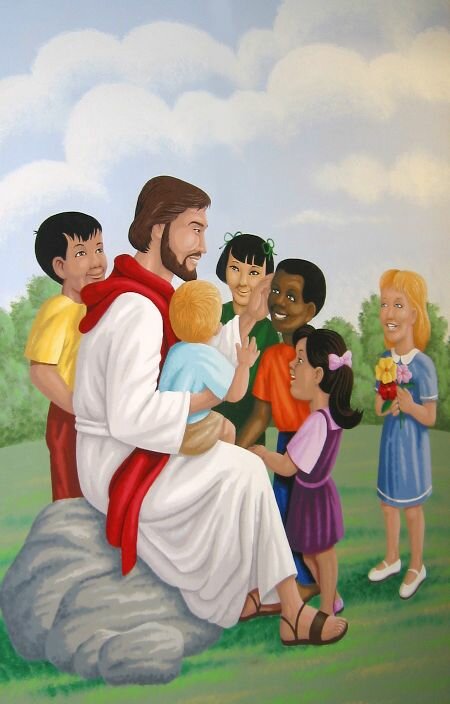Censorship of Child's Poster Depicting Christ Could Require SCOTUS Resolution
It's important for all parents of school aged children to realize something:
Political Correctness is not in the Constitution.
If asked to do an assignment where the child's opinion is part of the assignment, as in this case "to draw posters illustrating their understanding of the environment", if in the course of doing that assignment, God, Jesus or a religious overtone is presented by the student, the school cannot censor the student's work.
As an example, if the teacher told the kids to draw a picture of a recycle bin, and the child drew a picture of Jesus, then the school would have grounds to gripe a bit, because the student did not follow the instructions of the assignment. They still could not gripe about the picture of Jesus, because having a student draw the picture is not the school endorsing religion. It's the student who is endorsing religon.
I have learned through my own experience here in Texas, in regards to religon and school:
1. If asked to write or draw about a broad topic, the student cannot be censored for talking or drawing about God, Jesus and religion.
2. A student can take a Bible to school and read it during their own time. It must be treated as any other book brought from home. As long as the student is not reading it in class when they are supposed to be doing school work, the school cannot make the student stop.
3. Students can discuss God, Jesus and religion on their own time, during the school day. They cannot do so in class if another topic is under discussion. They must respect a student who does not want to listen and leave that person alone.
4. The school cannot make the student leave the area of the discussion, if they were there first and then a student, arriving later, complains about the discussion.
(AgapePress) - The United States Supreme Court may hear a case involving a school district's censorship of an art poster that a kindergartener drew for a school assignment -- a drawing that was partly suppressed by school officials because it contained the child's depiction of Jesus.
The case involves Antonio Peck, who was a kindergarten student in the late 1990s at Baldwinsville Elementary School in Syracuse, New York. The boy's teacher told members of the class to draw posters illustrating their understanding of the environment. Antonio's poster featured children holding hands and encircling the globe and people picking up trash and recycling, along with a picture of Jesus, kneeling with one knee to the ground and his hands outstretched toward the sky.
School officials folded the poster in half in order to cover up the drawing of Christ. They claimed the picture violated "church and state" and would give the impression that the school was teaching religion, even though the drawing was clearly a student's artwork.
According to the pro-family legal group Liberty Counsel, the fold made Antonio's look odd and the student's name on the poster was cut in half, and he felt ashamed of his displayed work, especially after school officials informed him and his parents why his poster was folded. The child assumed he had done something wrong, and when school officials refused to apologize, rectify the situation, or adopt a policy to prevent future censorship, Liberty Counsel filed suit on the Peck family's behalf.
Liberty Counsel president Mat Staver claims common sense should dictate "that no one would assume the school indoctrinated students in religion simply because one kid's drawing contained an unidentified religious figure." He argues that the fact that school officials would go "out of their way to humiliate a kindergarten student in front of his parents and classmates can only stem from antagonism to his Christian viewpoint."
In 2000, a federal trial court ruled that the school had the right to censor the child's poster due to "church and state" concerns. However, a court of appeals reversed that ruling on March 28, 2001, in a 3-0 decision, sending the case back to the trial court. And in 2004, the same trial court judge again ruled in favor of the school, at which point Liberty Counsel appealed.
On October 18, 2005, the Second U.S. Circuit Court of Appeals again ruled 3-0 in favor of Antonio. Nevertheless, Staver says the matter remains unresolved because there remains "a conflict among the federal courts of appeals."
Appellate Courts Render Split Decision on Religious Censorship Case
The Court of Appeals in Antonio Peck's case "got it right," Staver asserts. According to the Second Circuit's ruling, he explains, "when students give responses to a class assignment and as long as they respond within the subject matter of the assignment, you cannot censor their religious viewpoints."
However, the attorney points out, "There are other courts in certain parts of the country that have disagreed with that." While the Second Circuit joined the Ninth and Eleventh Circuits in saying schools may not censor students' viewpoints under such circumstances, the First and Tenth Circuits hold that viewpoint discrimination in the curricular context may be permissible. For that reason, Staver believes there is a good chance the Supreme Court of the United States will hear the case.
"When Justice Samuel Alito was a Federal Court of Appeals judge, he ruled specifically in a case that you cannot censor the Christian viewpoints of students when they give information or responses in response to a class assignment or instruction," the Liberty Counsel spokesman notes. "So I think this would be a great case for the court to take. We'll wait to see."
If the high court does take the case, Staver contends, "it could have a major impact on student free religious expression within the public school system."
In the Supreme Court justices did take up the matter, Liberty Counsel's president says his group anticipates that the court would agree with those appeals courts that say public schools may not discriminate against students' religious viewpoints when the students are addressing permissible subjects in response to class assignments.









0 Comments:
Post a Comment
<< Home